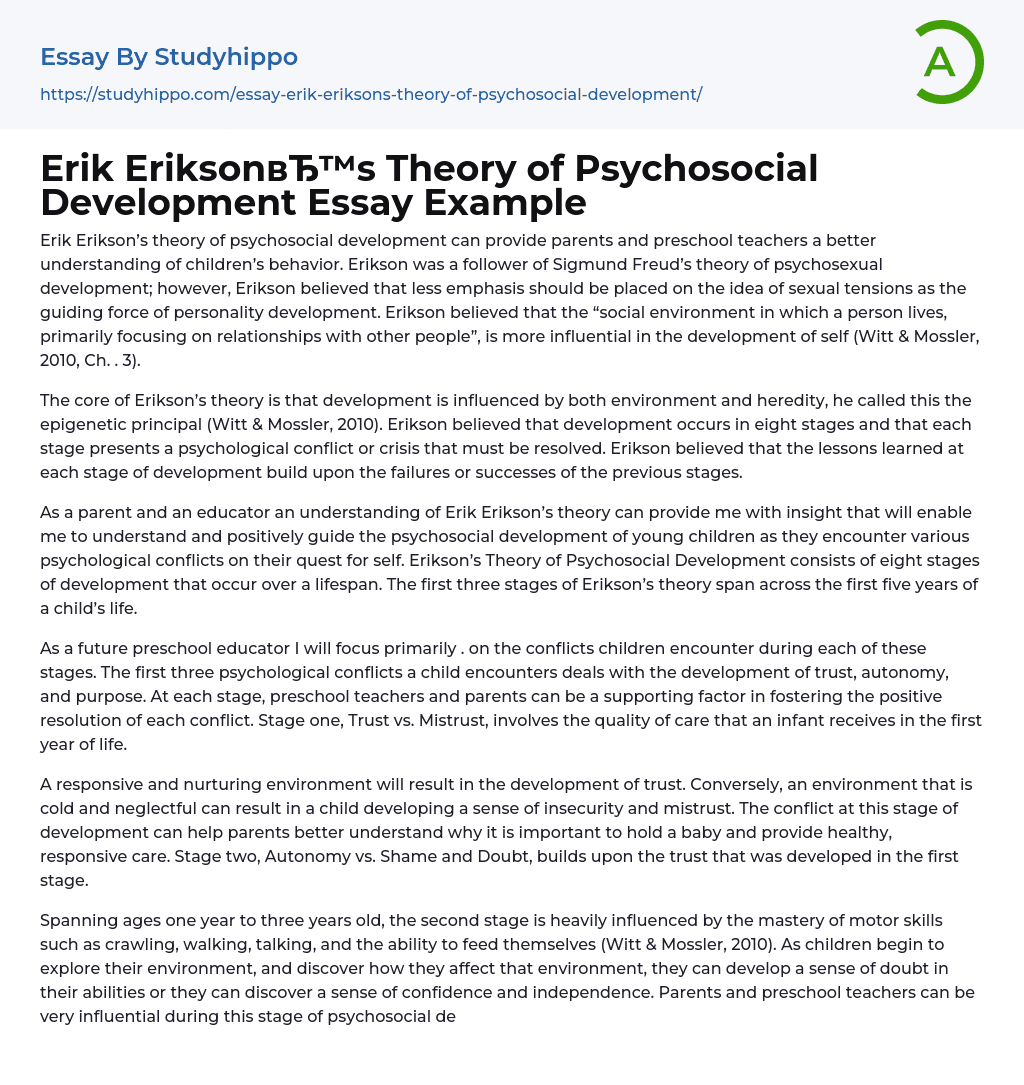

Erik Erikson’s Theory of Psychosocial Development Essay Example
Erik Erikson’s theory of psychosocial development can provide parents and preschool teachers a better understanding of children’s behavior. Erikson was a follower of Sigmund Freud’s theory of psychosexual development; however, Erikson believed that less emphasis should be placed on the idea of sexual tensions as the guiding force of personality development. Erikson believed that the “social environment in which a person lives, primarily focusing on relationships with other people”, is more influential in the development of self (Witt & Mossler, 2010, Ch. . 3).
The core of Erikson’s theory is that development is influenced by both environment and heredity, he called this the epigenetic principal (Witt & Mossler, 2010). Erikson believed that development occurs in eight stages and that each stage presents a psychological conflict or crisis that must be resolved. Erik
...son believed that the lessons learned at each stage of development build upon the failures or successes of the previous stages.
As a parent and an educator an understanding of Erik Erikson’s theory can provide me with insight that will enable me to understand and positively guide the psychosocial development of young children as they encounter various psychological conflicts on their quest for self. Erikson’s Theory of Psychosocial Development consists of eight stages of development that occur over a lifespan. The first three stages of Erikson’s theory span across the first five years of a child’s life.
As a future preschool educator I will focus primarily . on the conflicts children encounter during each of these stages. The first three psychological conflicts a child encounters deals with the development of trust, autonomy, and purpose. At each stage, preschool teacher
and parents can be a supporting factor in fostering the positive resolution of each conflict. Stage one, Trust vs. Mistrust, involves the quality of care that an infant receives in the first year of life.
A responsive and nurturing environment will result in the development of trust. Conversely, an environment that is cold and neglectful can result in a child developing a sense of insecurity and mistrust. The conflict at this stage of development can help parents better understand why it is important to hold a baby and provide healthy, responsive care. Stage two, Autonomy vs. Shame and Doubt, builds upon the trust that was developed in the first stage.
Spanning ages one year to three years old, the second stage is heavily influenced by the mastery of motor skills such as crawling, walking, talking, and the ability to feed themselves (Witt & Mossler, 2010). As children begin to explore their environment, and discover how they affect that environment, they can develop a sense of doubt in their abilities or they can discover a sense of confidence and independence. Parents and preschool teachers can be very influential during this stage of psychosocial development.
Creating learning experiences that allow children to explore interactions with objects and other people will help children to develop appropriate self-control. In the educational setting this involves providing children with clear and achievable guidelines for appropriate behavior, taking children on field trips, developing age appropriate lessons, and using teachable moments to guide children as they learn how to express themselves in a rapidly expanding world.
Stage three, Initiative vs. Guilt, involves building upon the autonomy acquired in the
second stage. Children in stage three are ages three to five years old. The children that embraced independence during the previous stage of development are more likely to show initiative as they try to gain control over their surroundings and the people therein (Witt & Mossler, 2010).
Parents and educators can once again positively guide their child through this stage of development by being encouraging and avoiding making children feel guilt when they assert themselves. Erik Erikson’s Theory of Psychosocial Development can provide preschool educators and parents with insight into the conflicts that children face at different stages of their development. Educators and parents can then use this insight to design a learning environment that will foster the positive resolution of each psychological conflict.
Parents can provide their children opportunities to socialize with other adults and children and then use teachable moments within those situations to foster positive psychosocial development. Educators can foster socialization and self-control by taking children on planned and educational outings. Positive parenting styles, planned and purposeful learning experiences and an understanding of Erikson’s Psychosocial Theory of Development work in concert to put children on the path to positive development (Rathus, 2011).
- Home essays
- Dog essays
- Adoption essays
- Babies essays
- Children essays
- Love essays
- Parenting Teens essays
- Wedding essays
- Wife essays
- Aunt essays
- Daughter essays
- Parents essays
- Sister essays
- Foster Care essays
- Sibling essays
- Father essays
- Grandparent essays
- Mother essays
- Caring essays
- Dysfunctional Family essays
- Bedroom essays
- Room essays
- Relationship essays
- Jealousy essays
- Friends essays
- Online Dating essays
- Divorce essays
- Husband essays
- Marriage essays
- Hometown essays
- Parenting essays
- Family Tradition essays
- Family Values essays
- Baby Clothes essays
- Child essays
- Childcare essays
- Child labor essays
- Doll essays
- Walls essays
- Appreciation essays
- Single Parent essays
- Single Parenting essays
- Abnormal Psychology essays
- Abraham Maslow essays
- Attachment Theory essays
- Authority essays
- Behaviorism essays
- Classical Conditioning essays
- Cognitive Psychology essays
- Counseling essays



